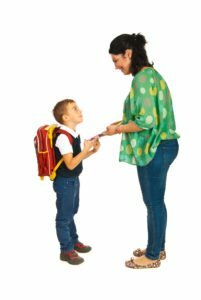This is our second week in our “new beginnings for the new school year” series. Last week we talked about how parents who might have had difficult experiences in school could help their kids to have better times. This week we want to talk about how teachers can help kids who might have struggled during a previous school year to have better beginnings.
Kids can be rejected by their peers for a number of reasons. They might not know how to enter a group without disrupting the ongoing play, they might be too pushy with their own ideas, or they might be aggressive. Research tells us that kids who are rejected by peers might become less socially skilled or more aggressive over time as they miss out on opportunities to practice appropriate skills. And the other kids remember. So if a child was rejected last year in school, chances are that his peers know that and may expect the same sort of behaviors this year, so they may reject him in advance, before he even has time to show them if he has learned new things or grown over the summer!
That’s where teachers can make a big difference and help kids who were rejected in the past get off to a fresh start this school year! Here are a few strategies you can try:
- Observe the child’s interactions with peers to find out what is not working well. Children who do not have very good social skills can quickly become rejected by peers who find them annoying or even scary. Maybe a child ignores peers’ cues to stop doing something that they find annoying. Or maybe the child doesn’t know how to ask other peers if he can play with them so he just barges in and grabs toys or materials. Identifying what skills the child may be lacking is the first step in helping things go better. Try to be specific about these skills. For example, saying a child has trouble being “nice” is vague, and it’s hard to know what you could do to change things. Instead, try identifying specific issues, such as trouble taking turns, using appropriate language with peers, or sharing materials.
- Help the child to look for cues. Help the child to understand what peers mean when they look away or actually move away from her. That is a signal that they may want the child to stop what she is doing to them. Or maybe she needs to be reminded to listen to peers’ words like “Please stop”. Children who have trouble joining the group may need to be reminded that when the other children are paying attention to something else, that is a signal that they are already busy.
- Pre-teach the child what TO do. A child who is doing something that peers find annoying is probably just trying to get their attention. Help her to find some better ways to do this. Maybe she could ask others “What do you want to play?” or give her peer a compliment such as “I really like your shirt”. For the child who does not know how to enter a group, suggest some things that he could say to get other children’s attention without disrupting them such as “Can I play, too?” or “That’s a fun game. How do you play?”
- Role play the new skills. Help a child to act out the new social skills with you before she tries them out with her peers. Role playing could go something like this: “Let’s pretend that you want to talk with Marissa. What could you say?…. Maybe you could say ‘Are you waiting for the swings?’….Good. I am going to pretend to be Marissa and you can pretend that you are coming to talk to me…..” You can also give the child feedback like “That was great way to start talking. I bet Marissa would really like it if you also smiled when you talked with her…..”
- Teach the child constructive ways to handle disappointment. Sometimes a child can become rejected by peers because she reacts very negatively whenever she is disappointed. There will be times when other children do not want to play or don’t have room in a game or activity for the child. So she has to learn how to handle that disappointment in a positive way. For example, she could shrug her shoulders, say “oh well”, and go look for something else to do. Or she could look for a child who is not playing with others and go play with that peer.
These strategies make take some time and planning but they can pay off by creating a more positive social atmosphere for ALL of the children in the class. Also, because the consequences of rejection can be pretty negative (for example, more aggression and increasing problems in school over time), helping children to get out of the spiral early can really make a difference for their futures. What a great reason to help a child make a fresh start with peers in the new school year!
[divider type=”standard” text=”Go to top” full_width=”no” width=”1/1″ el_position=”first last”]
Image: © Dorota Long | Dreamstime.com
[divider type=”standard” text=”Go to top” full_width=”no” width=”1/1″ el_position=”first last”]





